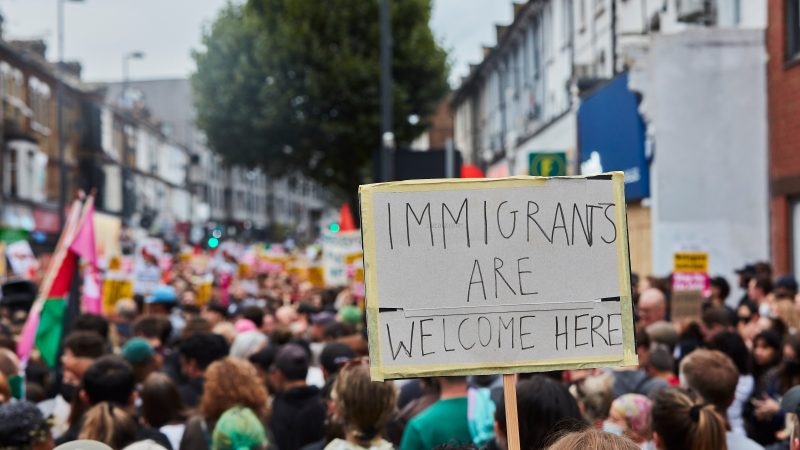Paul Mason: ‘How we can defeat the new fascism in the wake of Britain’s January 6’

The riots that followed the Southport murders were not just driven by racism and Islamophobia. They were conceived, both in the minds of the rioters and those inciting them, as a political challenge to the Labour government that was elected on 4th July.
So this is our equivalent of America’s January 6th: a challenge to our values, to the rule of law and to the legitimacy of Labour’s project of national renewal and social cohesion.
While the government has done the right thing – centralising the public order response and mobilising the criminal justice system to deliver swift, tough, sentencing – as a party and a movement we, too, need to adapt.
‘Today’s fascism is networked and global’
This is not the fascism my generation had to confront in the 1970s and 80s. That was a hierarchical, nationalist and largely powerless movement – easily contained by mass, community mobilisations as at Lewisham in 1977, and by big counter-cultural events like the ANL carnivals.
Today’s fascism is networked and global. While the small fascist parties pose a threat, and need to be monitored, far more important are the “influencers”, whose calls to action and racist content can be sent viral by the algorithms of social media, or even their deliberate promotion by Elon Musk. Their targets change by the week; their methods mutate fast; and their actions are boosted by foreign powers, like Russia, and by far right movements in foreign countries.
The challenge for policing is obvious: in the riots of the past, the target of the rioters were either the police themselves, or a government policy or building. The target of fascist rioters is individual people of colour, Uber drivers, minority-owned shops and, of course, Mosques.
That means the public order policing tactics taught to other forces by the Met have to change, and rapidly. Simply dispersing rioters and arresting them later leaves them free to inflict terror on members of the public – a terror which leaves BAME friends and colleagues justifiably apprehensive as they go about their everyday lives.
‘Reform surge driven by racism, ‘anti-politics’ sentiment and exasperation at economic insecurity’
I am hopeful that the swift, tough sentencing – including for those casually inciting arson and murder online – will have a rapid impact. Because it was sparked by viral information, the quicker the tears, regrets and four-year prison sentences of the rioters also go viral, the quicker this might end.
But we need to face an unpalatable fact. If 7% of the British public think these riots are justified (according to YouGov), that’s close to four million people. Most of those people will never riot, but we know that the Reform surge at the election was driven by a mixture of racism, “anti-politics” sentiment and exasperation at the economic insecurity working class communities face.
READ MORE: ‘Celebrating difference isn’t enough. We have to celebrate our togetherness too’
What’s triggered this – beyond all the individual flashpoints – is the sudden realisation by the racist minority of the population that they’ve lost the only government that was ever going to sympathise with their prejudice, and there is almost no route back.
The new fascism is fuelled not just by prejudice but by a theory: that migration is a form of “invasion”, that we, the “woke liberals” are its collaborators, that a shadowy global elite is trying to wipe out the white race, and that it will all end with an ethnic civil war.
That’s why it is so dangerous for the richest and man in the world to broadcast to his 300m followers that “civil war is inevitable”.
Sign up to our must-read daily briefing email on all things Labour
‘We are unwilling combatants in an information war’
Networked fascism calls for a different kind of resistance. The problem in your town may not lie in the small local branch of Patriotic Alternative, or a “football lads” group. It may lie with the scattered followers of a far-right influencer living in Thailand, or an anonymous channel run from Russia, who we only find out about when they leave their bedrooms and torch a law firm.
We are, in short, unwilling combatants in an information war that few of us know how to fight.
In response, we need the government to move swiftly on information legislation. The Online Safety Act is weak: but the biggest problem is that it’s still not been fully enacted. I want to see the government bring its full provisions into force immediately, ending the consultation process. It should demand that Twitter and other platforms take measures to mitigate the distribution of incitement, disinformation and hate speech. There are, in the end, large fines and even criminal sanctions if they refuse.
On top of this we need to centralise the intelligence response. Remarkably, there is no body in Whitehall with the job of linking what the police see, what MI5 and GCHQ see, and what specialist anti-racist NGOs monitor – in a way that can predict and disrupt the violence. And the Tories left us without a counter-extremism strategy, or the money to pay for it.
Politically, many of the counter-demos called for this weekend are organised by groups that have no chance, on their own, of uniting all communities and faiths. We need a big, national, cross-party umbrella campaign as soon as possible. But that’s no reason to stay inactive: we need, as a party, to stand with those who want to peacefully protect the refugee hotels and places of worship.
We can defeat the fascists – not just with tough law enforcement and community solidarity, but by making Britain a “militant democracy”: a democracy armed in its own self defence. And of course by the speedy delivery of the economic, climate and social justice we campaigned for at the election.
No comments:
Post a Comment